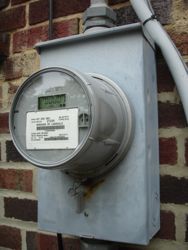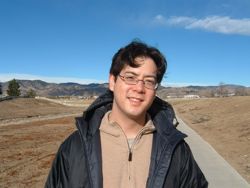Smart Meter, Big Brother
Air Date: Week of February 25, 2011

A smart meter. (Wikipedia Creative Commons)
The goal of smart meter technology is to improve energy efficiency, cut greenhouse gases and save consumers money. But Kevin Doran, a Senior Research Professor at the University of Colorado, tells host Bruce Gellerman that these smart meters raise privacy concerns because they can potentially reveal personal details about customers' at-home behaviors.
Transcript
GELLERMAN: Nearly 9 percent of the electric meters in the U.S. are smart - and more are on the way. These high I.Q. devices are designed to improve energy efficiency, cut greenhouse gases, and save you money.
All good things, but smart meters may be a lot smarter than you think - and know a lot more about you than you might want. Kevin Doran monitors smart meters. He's a research professor at the Renewable and Sustainable Energy Institute at the University of Colorado, Boulder. Welcome to Living on Earth!
DORAN: Thank you!
GELLERMAN: So what makes a smart meter so smart?
DORAN: The idea behind a smart meter is that it communicates information to the utility, and in theory, the utility can also use that pathway, if you will, to send information back to the consumer, in terms of price signals, or in terms of switching off appliances when they're on but not being used and could be saving electricity. So, you think of it like this: you've got your traditional electricity system - transition, distribution - we're all familiar with that. The smartness comes into play when you add information on top of that.

Researcher Kevin Doran. (Photo: Kevin Doran)
GELLERMAN: Well, what can a utility know about me from a smart meter that they couldn't tell from a dumb meter?
DORAN: Well, think of a dumb meter - it just says to the utility, 'This is how much power you're using.' Now think about a smart meter that is hooked up to all of the appliances in your homes. When you're in a certain part of your house and you're turning on lights, the smart meter is knowing that. So all of these things that were kind of hidden to the utility, or to other interested parties, become capable of being discerned because of the information that's being sent through that meter.
GELLERMAN: So it can tell whether I'm toasting a bagel or getting a back massage?
DORAN: Well, no. But certain appliances definitely have certain energy signatures. So it could tell if you were using a microwave, which has a certain kind of signature. It could tell if you're using an oven, which has another kind of signature.
GELLERMAN: So how is this data from a smart grid any different than, you know, smartphones, or the data that comes from my using an E-Z Pass on the road, or Facebook?
DORAN: You know, it's becoming an increasingly transparent society that we live in. One of the concerns, especially with smart grid, is that so much of this is happening inside the home. And we've traditionally viewed the four walls of the home as a sacrosanct place of privacy. What smart grid does is it takes those four walls and it makes them essentially transparent.
And all of the intimate personal details that we assumed are our own, because they happen within those four walls, are now being communicated to utilities. And they're using this information to manage their load better - to make sure that customers are not using power at, let's say, peak power times, but using it at different times in the day so that they can use their system more efficiently. That very beneficial use aside though, there are all sorts of other kinds of information that come through the smart signal that could be capable of being used nefariously.
GELLERMAN: But it gets a lot more specific - you write that it can tell how often you arrive home around bar time, are you a restless sleeper, do you get up frequently throughout the night'they can tell all this from the smart meter's information?
DORAN: Yes and no. The information is just the information about the power usage that's happening in your house, and then potentially, about the kinds of appliances and when they turn on and when they turn off. That said, there's a whole lot of extrapolation that can be done on that data to figure this kind of information out.
So, to give you the example of: do you come home from'around the time when the bars close? So, you pull into your house and you start turning on all your lights. And then it becomes clear that somebody is now home, and let's say that it's around two AM, which is when the bars are closing. An insurance company looking at this information could see a pattern that shows that this person is routinely coming home at this period of time, and then make a correlation or an assumption that says, 'Ah, perhaps they're out there drinking, and we should have higher premiums for them.'
So, it isn't just the data. The data is one thing - but it's also the kind of sophisticated correlations and comparisons and data parsing that can be done on that data to figure out all sorts of things about a person's life.
GELLERMAN: Data mining.
DORAN: Data mining, essentially, yes. And it becomes even more concerning - I think, from a privacy perspective - when you realize it's not just about the smart grid data anymore. You know, our lives are increasingly digitized and placed online for other people to look at.
So it's about the movie preferences that you make at Netflix, or the blogs that you're participating in - and the reason I bring this up is because all of these data sets are floating out there. Now if somebody, for nefarious purposes, wanted to take your smart grid data and start hooking it up with other kinds of data about you online - financial data, for instance - you can fairly quickly see how easy it would be for a sophisticated user to reconstruct virtually everything about you. Your digital doppelganger would become clear.

A smart meter. (Wikipedia Creative Commons)
GELLERMAN: So the real question is: who has access to the smart meter information?
DORAN: Yeah, that is a critical question - and this is up for grabs. This is a battleground between utility companies, third party service providers that would like to be able to use this data to help customers manage their information, and people like marketers and advertisers who would like access to that information, and then consumer privacy advocates and consumers themselves.
And as policy makers figure out how to approach this entire new terrain, they need to be cognizant of the fact that there are serious privacy concerns out there, and much of the legislation and statutes that deal with privacy have no idea what to do when it comes to the smart grid because this is so new.
GELLERMAN: Professor, do you have a smart meter at home?
DORAN: I do not. I live in a town outside of Boulder, which is the subject of an experiment by the local utility here - it's called the Smart Grid Boulder City Experiment. So many of the people in Boulder do have smart meters on their homes.
GELLERMAN: And when a smart meter comes knocking on your door, what are you going to do?
DORAN: I'm gonna say yes. Because I think that we can do this. I think that we can do it in a way that makes sense for environmental, energy efficiency purposes, and that we can also figure out a way to make sure that this data is used appropriately. The critical questions upfront are going to be: who owns the data, and what kind of protections are placed on that data? And, although I'm sure it will not be a pain-free experience as we figure these answers out, I think at the end of the day, we'll be happy.
GELLERMAN: Well, Professor Doran, thank you very much, really appreciate it, learned a lot.
DORAN: My pleasure.
GELLERMAN: Kevin Doran is Assistant Research Professor at the Renewable and Sustainable Energy Institute at the University of Colorado, Boulder.
Links
Visit the University of Colorado at Boulder's Renewable and Sustainable Energy Institute
Living on Earth wants to hear from you!
Living on Earth
62 Calef Highway, Suite 212
Lee, NH 03861
Telephone: 617-287-4121
E-mail: comments@loe.org
Newsletter [Click here]
Donate to Living on Earth!
Living on Earth is an independent media program and relies entirely on contributions from listeners and institutions supporting public service. Please donate now to preserve an independent environmental voice.
NewsletterLiving on Earth offers a weekly delivery of the show's rundown to your mailbox. Sign up for our newsletter today!
 Sailors For The Sea: Be the change you want to sea.
Sailors For The Sea: Be the change you want to sea.
 The Grantham Foundation for the Protection of the Environment: Committed to protecting and improving the health of the global environment.
The Grantham Foundation for the Protection of the Environment: Committed to protecting and improving the health of the global environment.
 Contribute to Living on Earth and receive, as our gift to you, an archival print of one of Mark Seth Lender's extraordinary wildlife photographs. Follow the link to see Mark's current collection of photographs.
Contribute to Living on Earth and receive, as our gift to you, an archival print of one of Mark Seth Lender's extraordinary wildlife photographs. Follow the link to see Mark's current collection of photographs.
 Buy a signed copy of Mark Seth Lender's book Smeagull the Seagull & support Living on Earth
Buy a signed copy of Mark Seth Lender's book Smeagull the Seagull & support Living on Earth

